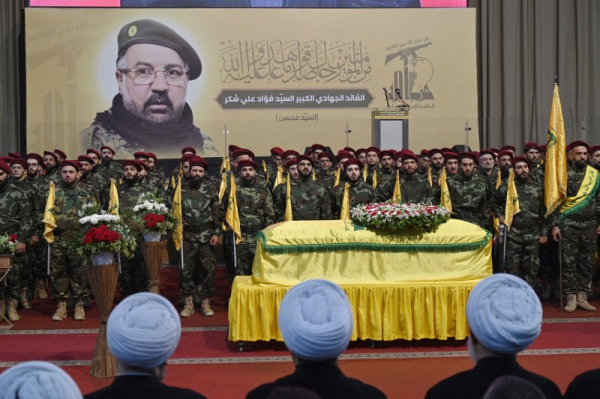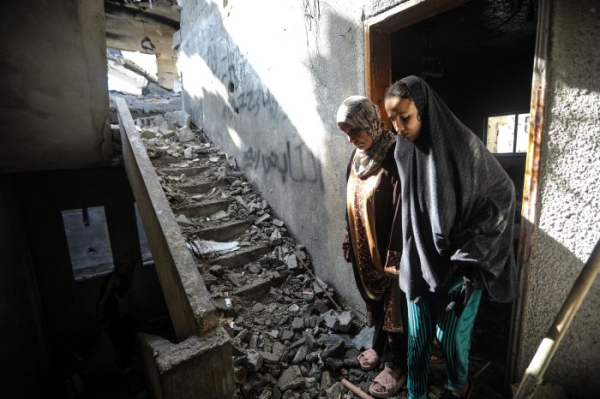
Hezbollah fighters stand next to the coffin of late senior Hezbollah commander Fuad Shukr, killed in an Israeli strike, during the funeral procession in Beirut on Thursday. Hezbollah leader Sayyed Hasan Nasrallah vowed at the funeral the Iranian proxy group would retaliate against Israel for his death. Photo by Wael Hamzeh/EPA-EFE
Hezbollah leader Sayyed Hasan Nasrallah on Thursday vowed “inevitable retaliation” for the death of senior Hezbollah military commander Fuad Shukr during an Israeli airstrike on Lebanon this week.
Speaking at Shukr’s mass funeral in Beirut, Nasrallah promised the Iranian proxy militia is looking for a “real and fully considered response” in retaliation for his death in a nighttime drone-launched airstrike on a building housing the Hezbollah command center Tuesday in Dahieh, a Shia Muslim suburb of the Lebanese capital. Advertisement
The Hezbollah secretary general warned that Israel “does not know where the retaliation will come from, whether from the north or the south of Palestine, and whether it will be separate from or simultaneous” with Hezbollah operations in other fronts, according to official Lebanese media.
“You will laugh a little and cry a lot, as you do not know which red lines you have crossed,” Nasrallah told the crowd during the funeral, adding that the strike against Shukr in Dahieh was not an assassination but rather “an aggression” that is “part of the U.S.-Israeli war on our region.” Advertisement
Shukr’s death was itself an act of retaliation by Israel after an alleged Hezbollah rocket attack Saturday landed in a soccer field near a playground and killed 12 children and injured many more at Majdal Shams in the annexed Golan Heights.
Nasrallah on Thursday again denied Hezbollah’s responsibility for the Majdal Shams attack, stating, “We have enough courage to admit if it was our mistake.”
It was the deadliest attack against Israel since the surprise Oct. 7 Hamas strike on Israel that killed about 1,200 civilians and saw hundreds of Israelis taken hostage. The resulting war against Hamas in Gaza has claimed nearly 40,000 Palestinian lives while the lack of a cease-fire after nine months of fighting is contributing a rapidly increasing escalation in violence across the region.
Fears that the conflict between Israel, Iran and its proxies Hamas and Hezbollah was escalating out of control were further fanned on Wednesday when Hamas’ political chief Ismail Haniyeh was assassinated during a stay at an Islamic Revolutionary Guard Corps guest compound in Tehran.
Specifics of the assassination were not immediately clear, but the New York Times reported Thursday that Haniyeh and a bodyguard were killed by a bomb that had been planted in his guest room months before his visit and then triggered remotely while he was inside. Advertisement
Meanwhile, Israeli military confirmed Thursday that it killed Hamas’ military leader, Mohammed Deif, in a targeted airstrike on Khan Younis in southern Gaza last month.
U.S. Secretary of State Antony Blinken spoke with Saudi Foreign Minister Prince Faisal bin Farhan Al Saud on Thursday about “ongoing tensions and developments” in the Middle East, the State Department said.
During the talks, Blinken “emphasized the importance of reaching a cease-fire in Gaza that secures the release of hostages and reiterated the importance of preventing the escalation or spread of the conflict.”
Blinken also called on “all parties to stop taking any escalatory actions” during an appearance in the Mongolian capital Ulaanbaatar.
“As for the Middle East, the region is currently on the path to multiplying conflicts, violence, suffering and insecurity,” he told reporters. “It is essential to break this cycle, and that starts with a cease-fire that we are working on.”
Scenes from Gaza: Palestinians in Rafah dig out from attack

Palestinians search the rubble of homes destroyed by an overnight Israeli bombardment in Rafah in the southern Gaza Strip on March 25, 2024. Photo by Ismael Mohamad/UPI | License Photo